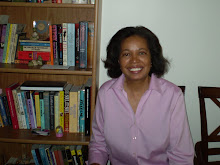
1852: Uncle Tom's Cabin
Authored by Harriet Beecher Stowe a white abolitionist, is the first major American novel to feature an African American hero and become one of the most influential works to stir anti-slavery sentiments by shedding light on the horrors of slavery.
In her story, even kind Southern whites who care about slaves suffer the ill effects of being slave owners. The presence of slavery corrupts their ability to work as a family, What Stowe wants her white readers to see is that there can't be harmoniously good, white slaveholding families. There isn't a way of making slavery and Christianity compatible. It just doesn't work.
It's 2007 and people are still trying to make oppression and Christianity work. How ridiculous it was then, is how ridiculous it is now.
Uncle Tom's Cabin was the best selling novel of the century, with the bible holding steady at number one.
The book, with its dramatic storytelling, no-holds-barred discussions of the hot-button issue of the day, and heart-rending conclusion, was an instant bestseller. By year's end, it had sold an astonishing 1.5 million copies worldwide.

The novel had "a great impact on people's notions of the evils of slavery," says Thomas Gosset, author of "Uncle Tom's Cabin and American Culture." Many Northern soldiers in the Civil War had read it, he says. When Abraham Lincoln met Stowe at the White House in 1862, according to Stowe's daughter, he said, "So this is the little lady who wrote the big book that made this great war." Much later, writer Langston Hughes would call "Uncle Tom's Cabin" America's "first protest novel."
Uncle Tom goes to the circus.
But its fame and success was also the start of trouble for the image of Uncle Tom. The novel was made into a number of highly successful theatrical shows. Stowe held no copyright to prevent stage adaptations, which were done without her approval and without compensation. At one point, nearly 500 "Tom companies" were performing around the country, including one by showman P.T. Barnum. These shows removed some characters in the book, enlarged the roles of others, and added song and dance, even comedy, to conform the story to the elements popular in the minstrel shows of the day.
The story was "seized by popular culture, and people ran away with it and basically did what they wanted to with it," says Kathleen Hulser, curator of a new exhibition, "Reading Uncle Tom's Image: a Reconsideration of Harriet Beecher Stowe's 150-Year-Old Character and His Legacy". "The Uncle Tom that we know as an insult – as an old man who is meek, submissive, doesn't stick up for himself, desexualized – that really isn't who the person is in the novel. It's who he became on stage."
Note: Uncle Tom became the insulting nickname for a wussie black person whose behavior is subservient and over accommodating especially toward whites. A Tom also refers to those Blacks with political views considered to be anti-black.
These shows, usually played in blackface by white actors, lingered well into the 20th century. But by the 1930s, blacks began to gain the ear of white Americans with word that this version of Uncle Tom was not appreciated. Nevertheless, the meaning had stuck. By the 1960's, Uncle Tom had gone from being simply weak to being a "race traitor".
The Uncle Tom of the novel is a young and strong slave in the pre-Civil War South, a father of three young children who chooses, out of his Christian convictions, martyrdom over violence to deal with his oppressors.
At the end of the novel, Uncle Tom sacrifices his life to protect others. He dies because he won't reveal to [his master] Simon Legree the presence of two female slaves who have been sexually exploited by Legree.
It remains controversial. However, on college campuses today, Uncle Tom's Cabin appears to have won an enduring place in the study of popular historical images of blacks.
The 150th anniversary examination of this novel showed that the story of "Uncle Tom" and the book that introduced him to Americans is much more complex than a simple story of a racial insult. Despite its flaws, Uncle Tom's Cabin presents the most broad, warm, fully developed cast of black people who had ever been in a novel in the United States.
This novel played an important part in stirring the conscience of America toward anti-slavery. We don't want to forget that.


No comments:
Post a Comment